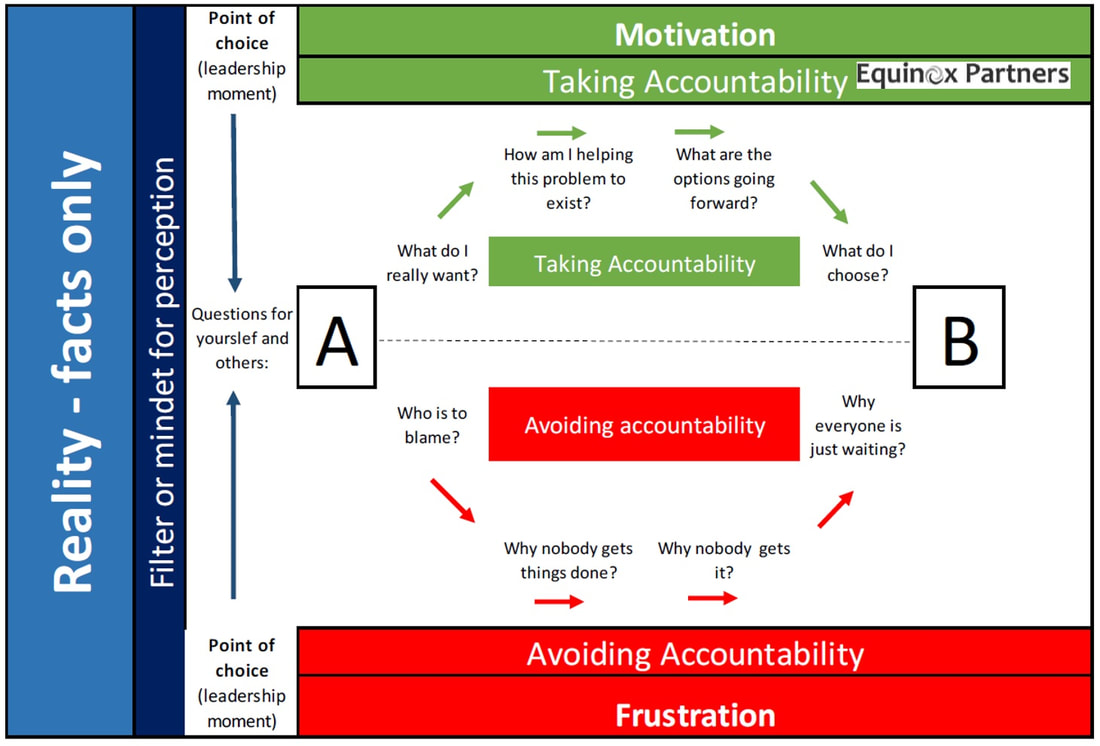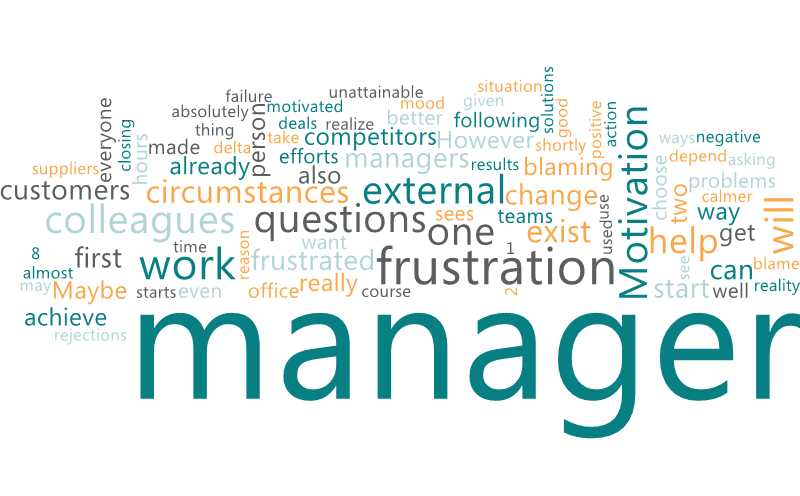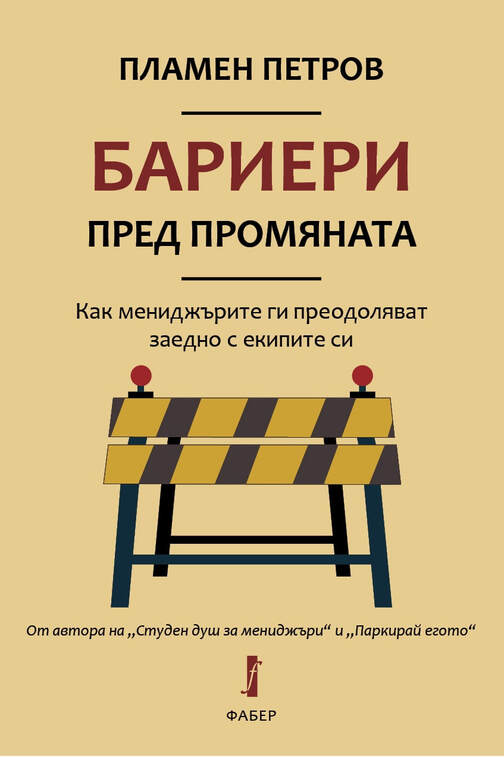|
"Everyone wants to change the world, but no one wants to change themselves." Leo Tolstoy Each manager chooses for himself how to go through his daily work - with motivation or frustration. Note that motivation or frustration does not depend on external factors, colleagues, customers, suppliers, etc. They depend solely on the person who experiences them. Motivation is a choice. Frustration is also a choice. You may feel frustrated by external circumstances, but this is not the case at all. Imagine a young account manager who in the first days of his work sees that he has made 100 calls to clients and none of them has answered positively. The young account manager is frustrated because he has made significant efforts against which he sees no results. There is a feeling that there is some huge invisible barrier between him and his monthly target. At one point he even begins to despair, and momentary frustration gives way to mild depression in the following weeks. The young account manager first starts accusing his clients of being rude and closing their phones. Then he blames his colleagues for not helping him. Finally, he blames his manager for his own failure to sell. He is already thinking about leaving. The young frustrated account manager blames his customers, competitors, colleagues, and manager. He can't help but wonder how he contributes to the lack of sales. Maybe he doesn't open the conversations well? Maybe he's being too polite on the phone? Maybe he has already mentally given up and sees each new refusal as a confirmation that his monthly target is absolutely unattainable? More experienced account managers, however, receive the same number of rejections from their customers over the phone, but in their expression and mood, there is lightness. There is no sign of frustration. What is the difference between the young frustrated account manager and the experienced motivated one? They face the same rejections, work in the same office, have the same manager, have the same bonus scheme. Their external circumstances - both positive and negative, are absolutely identical. The only difference between the two is the way they look at what is happening in the external environment. The frustrated young account manager has the feeling that he has no control over the situation, blames his clients, competitors, colleagues, and manager. The experienced account manager knows that he has complete control over his efforts. There is no complete control over the result. But he knows that the result depends on his efforts and focus on finding the best course of action, not on blaming others. The only person the experienced account manager blames is the person in the mirror. But how did this experienced account manager get to this state of being highly motivated, even when there is no external reason for it? He reached this state mainly thanks to his manager. His manager used the Socrates method and a few painful questions to support him in getting better, regardless of external circumstances. At the beginning of his work, the experienced account manager also blamed his clients, colleagues, competitors, and manager when he did not achieve his monthly goals. However, he was at work for 8 hours, but the goals were not achieved. According to him, the goals were not achieved, not because he is not good enough, but because the goals are too ambitious. When this experienced account manager complained to his manager that he was not achieving his monthly goals because of external circumstances, his manager neither agreed nor rejected his claims. Instead, his manager asked four questions that shaped the northern arc of the Motivation or Frustration model. The questions are: Facts: The account manager cannot achieve the monthly goals Manager: What do you really want? Account manager: To achieve my goals. However, they are unattainable because our prices are high, the competitors are very aggressive and the customers choose their suppliers in some dubious ways. Besides, all good customers are already served by other colleagues. And you have given me companies with which no one has previously closed deals. Manager: How do you "help" this problem to exist? Account Manager: Well, first I get angry because I don't think such a distribution of the accounts is fair. When I get angry, I talk a little sharper to everyone - both clients and colleagues. Then they react to my tone in the same way, and they talk more sharply. And honestly, almost every conversation stops shortly before we quarrel about something. Also, as the day goes on, I smoke a little more often, extend my breaks a bit, and even leave earlier. Hence, the time in which I really work on my goals decreases a lot and I don't really have 8 effective hours of work. Manager: You have already listed two ways in which you "help" your problem to exist - you speak sharply and angrily to colleagues and clients, and you also do not use all working hours while you are in the office. What do you choose to change? Account Manager: The first thing I can do is try to be a little calmer and friendlier at the beginning of the day. It's up to me. Maybe I can move my gym training before, not after work, to have more energy at the beginning of the day. So, I guess the conversations will become calmer, for I may have better chances for closing the deals. Manager: What is your first step towards this? Account manager: Tomorrow I will start with morning fitness and from there - with a better mood in the office. And from there - we'll see. In this dialogue you will notice two things: 1) The manager does not blame the account manager for failing. Failure is not a person, but an event. And the manager works with him. He creates psychological safety and provokes the search for solutions, not the search for guilt. 2) The manager asks questions. He does not give ready-made decisions about what the account manager should change. Following these two rules - creating psychological safety + asking quality questions, over time leads to only one thing - progress. This example with the account manager and his manager is, of course, a small representation of how the Motivation or Frustration model is used in practice. Visually, the model looks like this:  We start with reality. It is what it is. But few managers see it objectively, because they look at it through the filter of their own experience, prejudice, and biases.
Then, when reality doesn't live up to expectations, it's perfectly normal for frustration to occur. In fact, the only source of negative emotions in your life and work is the delta between what you expect and what you are experiencing. This delta can frustrate you or motivate you. If you take the southern arc of the model and start blaming the people and circumstances around you, you will get just that - frustration. However, if you look at yourself and realize exactly what you want to achieve, how you "help" the problem to exist - then the solutions and motivation for action will automatically appear. The four questions that are at the heart of the Motivation vs Frustration model and that you can use as a manager in almost any situation with your teammates, and with yourself, are: 1. What do you really want? 2. How do you "help" this problem to exist? 3. What are the possibilities? 4. What do you choose? All the questions are important, but the most crucial is the second one. It focuses managers and their teams in the right direction - to realize how they "contribute" to the problem to exist and from there to take actions to overcome any obstacles. All chronic problems in teams exist only because managers in some way "help" their existence. Then, when managers recognize how they "help" the problems and have the will to make a change - the positive results will become visible shortly. But if you stay in the mode of blaming others and asking questions on the southern arc of the model (Who is to blame? Why is no one doing their job? Why is everyone waiting?) - then the problems will deepen. Because of the manager, not because of the people in the teams or the external circumstances. Although they can be cited as reasons. But there is only one reason. And this is - the team manager, i.e. you.
0 Comments
Leave a Reply. |
Архиви
July 2024
|
__________________________________________
Copyright © 2011-2024, Equinox Partners Ltd. All rights reserved.
Copyright © 2011-2024, Equinox Partners Ltd. All rights reserved.


 RSS Feed
RSS Feed


